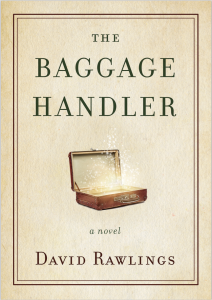by David Rawlings, @DavidJRawlings
The writing process can be easy to romanticize and even easier to describe.

Find a laptop, and straighten it in front of you on the desk. Place your coffee mug just to the right – and make sure it carries a wrap-around slogan proclaiming your proud grammar Nazism or reminders you should be writing. Place a pencil diagonally on a fresh notepad to one side. Sit, shrug your shoulders, roll your head on its axis, place your fingers on keys and let the wisdom channel through you. Park your backside in that chair until the inspiration runs out or your word count runs up.
Can you picture that? Is that you?
That used to be me. It’s not anymore.
When I was editing my debut novel, The Baggage Handler, I hit a number of hurdles in the plot stakes, or my brain couldn’t help but take one look at the words on the screen and simply rearrange them. I couldn’t find fresh eyes enough to turn the first draft into something better.
And parking myself in a chair until the words came out in the right order just wasn’t working. After some frustration at feeling like my process was letting me down, I bit the bullet and acknowledged that my process was letting me down. I needed to change things.
So I’d like to tell you of a technique I’ve been using ever since.
I printed my chapter, took my fingers off the keys, grabbed my iPhone and started pacing the house, reading my manuscript aloud. I became a dictator, hopefully, a benevolent one.
The editing process came alive. Just in changing up the process, I found some serious benefits in writing out loud:
- It physically changes up your thought process. You’re no longer processing your story in your head and getting your fingers to translate. You’re hearing it out loud. For me, that moves the story into another realm and uses two other senses. I’m not just reading, I’m hearing and I’m speaking, which changes the way I interpret the story.
- It changes how you approach dialogue. A couple of times I read out loud the exchange between characters and realized just how unrealistic it sounded. So I fixed it, using a conversation, albeit a one-sided one, to do it. That leads to …
- A change of style. This works for me, as I’m going for an accessible, almost conversational style that suits my contemporary genre. I’m now speaking – not writing – so when I transcribe my notes, I’m now using the style that naturally appears in my speech.
- You discover clumsy sections really easily. The minute your tongue trips over them, you realize it needs work. The moment you find yourself taking a breath mid-sentence, you need to reacquaint yourself with punctuation.
- I can more easily determine plot holes. As I’m hearing out loud a character’s reaction to a grenade I lobbed at them, I realize it might be too early for them to react how they did in the first draft, or that another character could provide another piece of information that would raise the stakes in a delicious way.
In a way, it’s like editing an audiobook but before the audiobook is recorded. So that’s what I’ve tried, and what now works for me. I’m not suggesting it will work for everyone, but maybe you might like to try it – if you’re looking for a new way of working through your manuscript or even just to mix things up for a change.
I’ve now written and edited my second novel (The Camera Never Lies, due out November 2019) the same way, and I’ve found a groove I wish I’d discovered a while ago.
So what do you think? Is that something you could try?
 Based in South Australia, David Rawlings is a sports-mad father-of-three with his own copywriting business who reads everything within an arm’s reach. He has published in the non-fiction arena and is now focused on writing contemporary Christian stories for those who want to dive deeper into life.
Based in South Australia, David Rawlings is a sports-mad father-of-three with his own copywriting business who reads everything within an arm’s reach. He has published in the non-fiction arena and is now focused on writing contemporary Christian stories for those who want to dive deeper into life.
He is currently signed with Thomas Nelson and represented by The Steve Laube Agency. His debut novel – The Baggage Handler – is available for pre-order on Amazon and will be launched on March 5, 2019.

